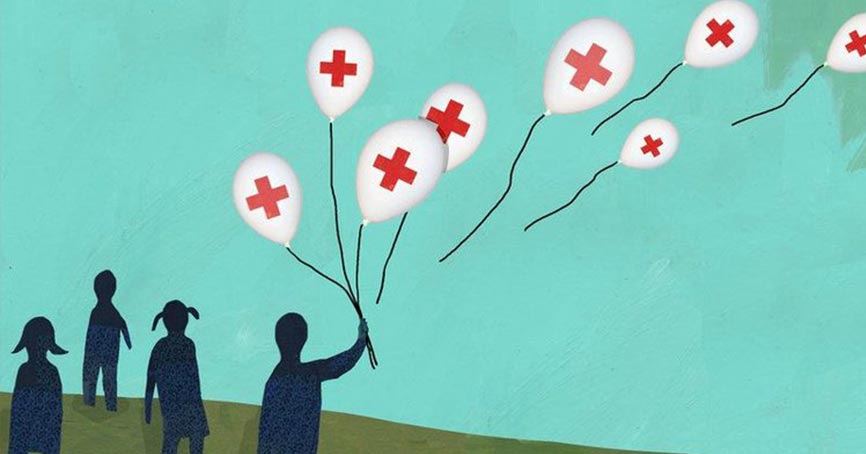What Is Diphtheria?
Diphtheria is a serious bacterial infection. Its toxin can harm or destroy the body tissues and organs. This infection mainly affects the mucous membranes of the nose and throat. Although it easily spreads from one person to another, diphtheria in children can be avoided by the use of vaccines. In temperate climates, this infection tends to happen during the colder months.
Consult the doctor right away if any symptoms of diphtheria are visible in the child. To put it differently, if it's left untreated, it can cause serious damage to the nervous system, kidneys, and heart.
Causes of Diphtheria in Children
As per the
Indian Council of Medical Research (ICMR), the mortality rate, which is normally 5 to 10% is increased to 20% in children below five years due to diphtheria. Diphtheria is caused by exotoxin-producing Corynebacterium diphtheriae. The diphtheria toxins can enter the body through the mouth and nose.
Other than this, it can also enter the body through a break in the skin. Diphtheria germs are transmitted from person-to-person in close contact with the infected child. It spreads through drops that contain diphtheria bacteria from an infected person sneezing, coughing, or laughing. After being exposed to the germs, this infection usually takes two to four days for symptoms to show.
What Are the Symptoms of Diphtheria?
In some cases, the symptoms are not much visible, while others may experience mild symptoms that are alike to those of the common cold. The most noticeable and common symptom of diphtheria in children is a thick, gray covering on the tonsils and throat. Other common symptoms include:
- feeling chills
- a fever
- bluish skin
- a loud, barking cough
- swollen glands in the neck
- a sore throat
- drooling
- a feeling of discomfort or uneasiness
Moreover, some added symptoms may occur, including:
- slurred speech
- changes in vision
- a problem in breathing or swallowing
- signs of distress, such as sweating, pale and cold skin, and a fast heartbeat
Is Diphtheria Contagious?
Yes, it is a highly contagious infection. It easily passes from an infected person to others through coughing, sneezing, or even laughing. Also, it can affect the person who picks up drinking glasses or tissues used by the infected person. A child infected with the diphtheria bacteria can infect others for up to 4 weeks, even if no symptoms are visible.
How Can Diphtheria Be Treated?
Diphtheria treatment depends on the child’s symptoms, age, and general health. It also depends on how severe the condition is. Apart from antibiotic medicine suggested by the doctor, parents can also use these remedies for treating diphtheria in children. For instance:
- Rest: Complete bed rest should be taken. Besides, it may vary as per the doctor's diagnosis.
- Orange juice: A child should intake orange juice as it contains ingredients that boost the immunity as well as assist the body to kill the germs.
- Mango bark: Bark of mango is helpful in the treatment of diphtheria. The fluid from the bark can be applied topically on the throat. The fluid extracted can also be used as a gargle.
- Lemon juice: Lemon is appreciated for its detoxifying properties. Therefore, due to its high potassium content, the toxins of diphtheria can be destroyed.
- Raw papaya: Raw papaya extracted juice is highly beneficial for treating diphtheria. Consumption of its juice dissolves the membrane and avoids the infection from spreading.
Also, talk with the child’s doctor about the benefits, risks, and possible side effects of the cure. Later, pursue the treatment if the doctor gives a thumbs up.
Prevention of Diphtheria in Children
This serious medical condition is preventable with the use of vaccines and antibiotics. The vaccine for preventing diphtheria in children is called DTaP. It is usually given in a single shot along with vaccines for tetanus and pertussis. The DTaP vaccine runs in a series of five shots. It is given to children at the following ages:
- 2 months
- 4 months
- 6 months
- 15 to 18 months
- 4 to 6 years
In exceptional cases, a child might be sensitive or have an allergic reaction to the vaccine.
Vaccines only last for
10 years, so the child will need to be vaccinated again around age 12-14. When the child becomes adult, it is recommended to get a combined diphtheria-pertussis-tetanus booster shot once. Taking proper care and timely immunization can help prevent the child from getting diphtheria in the future.

 Jun 04, 2019
Jun 04, 2019
 May 30, 2018
May 30, 2018 May 10, 2018
May 10, 2018 May 17, 2018
May 17, 2018